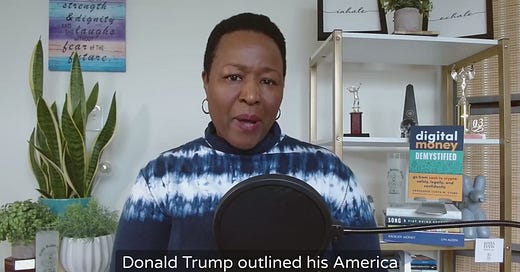At today’s 2025 BlockWorks Digital Asset Summit, President Donald Trump outlined an assertive vision to position the United States as the global leader in cryptocurrency. His remarks emphasized not just embracing innovation but also exerting control. Trump's plan aims to establish the U.S. as the world's "Bitcoin Superpower," positioning Bitcoin not as a decentralized alternative to traditional finance but as a strategic asset to be accumulated, regulated, and centralized under American authority.
Trump's speech outlined several key initiatives:
Creation of a U.S. Strategic Bitcoin Reserve: Trump proposed building a national stockpile of Bitcoin, akin to a gold reserve, with the goal of protecting its value and using it to manage national debt and economic stability.
Ending Regulatory Hostility Toward Crypto: He pledged to reverse previous regulatory pressures on crypto companies and establish clear, favorable rules for stablecoins and crypto market structures.
Dollar-Backed Stablecoins as Instruments of Financial Dominance: Trump positioned dollar-linked stablecoins as a means to reinforce the dominance of the U.S. dollar in global financial markets.
Establishment of a Crypto Advisory Council: Trump announced the creation of a high-powered advisory council to shape crypto policy, with industry leaders and political insiders vying for influence.
From Decentralization to American Control
Trump's strategy reflects a fundamental shift in how cryptocurrency is perceived and positioned. Bitcoin, in its original conception, was a rejection of centralized control—a peer-to-peer system designed to bypass banks, governments, and institutional authority. Satoshi Nakamoto's vision centered on self-sovereignty, borderless transactions, and financial inclusion, particularly for those marginalized by traditional financial systems.
Now, Trump's proposal to create a Bitcoin reserve and national advisory council raises the question: Can a government "dominate" a system inherently designed to resist domination?
Centralizing Bitcoin under state control could grant the U.S. government significant influence over market dynamics, potentially transforming it from a decentralized asset into a financial instrument of the state. This shift represents a profound transformation of Bitcoin's ethos—from a tool of individual empowerment to an instrument of statecraft.
Who Benefits From This Approach?
This strategy prompts critical questions about who stands to gain from this new pro-crypto posture. Trump's rhetoric suggests that dominance, rather than inclusion, is the primary objective. A national Bitcoin reserve could strengthen the U.S. dollar and attract institutional investment, but would it enhance access for unbanked communities, small businesses, or everyday investors?
Nearly 63% of Americans still lack confidence in crypto's safety and reliability, according to a recent Pew survey. Meanwhile, 4.5% of U.S. households—representing nearly 6 million families—remain unbanked, lacking access to basic financial services. The early promise of crypto was to offer these communities an alternative path to financial participation.
Instead, Trump's focus on a government-controlled reserve and advisory council suggests that crypto may be heading toward greater consolidation in the hands of established financial institutions and political elites. In this framework, the benefits of crypto's rise—whether through market growth, stablecoin dominance, or state-backed reserves—may be concentrated among institutional investors and political insiders.
Access or Control?
Trump's plan is framed as a win for innovation and national strength, but the tension is evident: Can Bitcoin remain a tool for financial empowerment if it becomes a government-controlled asset? If the U.S. builds a Bitcoin reserve, does that elevate the broader crypto ecosystem, or simply create a new class of institutional beneficiaries?
Stablecoins tied to the dollar may reinforce the strength of the U.S. financial system, but what implications does this have for decentralized finance, peer-to-peer payments, and financial inclusion? Bitcoin's strength has always been its ability to function outside of state control. Bringing it under federal authority may increase market stability but could undermine its role as an alternative to traditional financial structures.
A Defining Moment for Crypto's Future
Trump's embrace of Bitcoin signifies a shift from viewing crypto as a decentralized force to leveraging it as a tool of geopolitical strategy. The financial elite's newfound enthusiasm for Bitcoin indicates that the asset class has "matured," but at what cost to those who saw it as a pathway to independence and empowerment?
The crypto community has long touted Bitcoin as "digital gold," but gold has historically been a state-controlled asset used to bolster economic dominance, not a tool of financial liberation. Trump's vision for Bitcoin may elevate its value, but primarily for those already positioned within established power structures. The pressing question is whether this new era of government-backed crypto will create opportunities for those marginalized by the current financial system or simply reinforce the existing barriers that crypto was originally designed to dismantle.
Ultimately, the question is not whether America can dominate Bitcoin; it's whether dominance is the appropriate goal at all.
🔔 Subscribe to stay ahead of the crypto curve — The next era of digital assets is being written right now. Watch the complete speech here:
Question? Is this good for America? Is it good for Bitcoin? For the crypto industry? The end user (consumers and investors)? Chime in, sound off in the comments!






Share this post